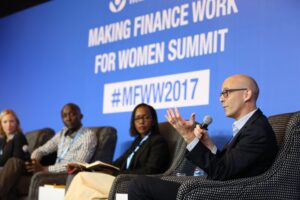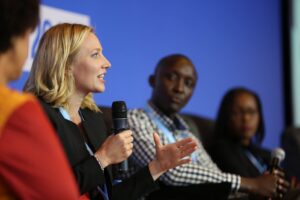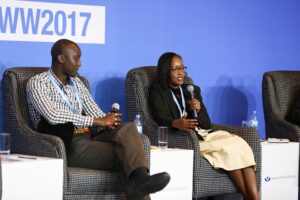Attendees at the Making Finance Work for Women Summit had the opportunity to hear from four very different players working in what is arguably the most exciting, if not the most high-profile space in financial inclusion: financial technology or FinTech.
At the breakout session “New and Emerging Platforms,” a payments giant , a tech giant, an “alternative” lending disruptor and an “alternative” electricity provider discussed how their companies were approaching serving the low-income market.
 The ‘giants’ were represented by Michael Elliott of Mastercard Labs for Financial Inclusion and Caitlin Sanford of Facebook. Both players, particularly Facebook are in the early stages of venturing into offering services to the Bottom of the Pyramid (BoP). On the other hand, the ‘alternative providers’ represented by Paul Muli of Greenlight Planet, a pay as you go (PAYG) solar energy provider and Rose Muturi of Tala, smartphone app that uses alternative data to deliver instant credit had serving the BoP in their company DNA.
The ‘giants’ were represented by Michael Elliott of Mastercard Labs for Financial Inclusion and Caitlin Sanford of Facebook. Both players, particularly Facebook are in the early stages of venturing into offering services to the Bottom of the Pyramid (BoP). On the other hand, the ‘alternative providers’ represented by Paul Muli of Greenlight Planet, a pay as you go (PAYG) solar energy provider and Rose Muturi of Tala, smartphone app that uses alternative data to deliver instant credit had serving the BoP in their company DNA.
All four panellists reiterated sounding themes Women’s World Banking has seen during years of work with women. For instance, though women are underserved, they are better at loan repayment and more loyal customers. Women also like the security and anonymity/privacy that digital finance provides.
One theme was common across the four very different players was the importance of partnerships. As Rose Muturi put it “get strategic partners, so at the end of the day, the customer is the winner”. Caitlin Sanford echoed this notion, hinting at the growing recognition that technological solutions must be adapted to the local context: the “key is to have the right partners…[so we can] design country-level solutions.”
 Payments + Banks
Payments + Banks
Mastercard is testing supply chain payments in Kenya targeting Africa’s small-scale farmers, agents, large-scale buyers and financial service providers. It connects farmers, buyers and agents through both feature and smartphones and facilitates the entire transaction.[1] In partnership with Kenya Commercial Bank, the solution will enable small scale farmers to access financial services such as credit, insurance and savings through their mobile phones.[2]
Social Network + Mobile Money
Facebook is testing Messenger payments in the Philippines with GCash and PayMaya (Globe and Smart Telecom business, respectively) allowing users send money, pay bills, and buy airtime via Messenger. The Philippines is a test launch. “We want both MNOs and banks to plug in. We’d give priority to places with KYC and agent networks,” said Caitlin Sanford.
Energy + Financing
Greenlight Planet has a pay-as-you-go model (PAYG) and leases solar panels. If the customer cannot afford to buy panels, they can pay in instalments – daily, weekly, monthly and can be done in partnership with telecom operators and financial services providers, including microfinance institutions. The solar- powered lights and phone chargers are used by 30 million customers in South Asia, Latin America, East Africa and West Africa today. Over 7 million Sun King lamps have been sold to-date.
 Mobile Data + Credit Scoring
Mobile Data + Credit Scoring
Tala changing the way credit scoring and financial services work. The company employs a mobile app and estimate credit worthiness using data on their mobile devices. Tala disburses loans in minutes to customers using mobile wallets and traditional cash-out options. They are exploring partnerships to offer microinsurance and value chain finance in the future.
That each company is working on solutions requiring partnerships demonstrates the importance of building a supportive ecosystem in digital finance to ensure double bottom-line success.
Women’s World Banking is thrilled at the entry of these players in the digital space. Their innovative models have a tremendous potential to accelerate women’s financial inclusion by overcoming the barriers to access women face. Without a focus on women’s needs and context however, this potential will not be realized. Women’s World Banking will continue to engage players such as Facebook, Mastercard, Greenlight Planet and Tala to ensure that women stay top of mind in the digital inclusion race.
[1] https://newsroom.mastercard.com/mea/press-releases/digitising-the-agriculture-value-chain-for-the-benefit-of-east-africas-economies/
[2] http://www.mastercardfdn.org/kcb-group-and-the-mastercard-foundation-announce-agricultural-finance-program-to-benefit-two-million-farmers/



